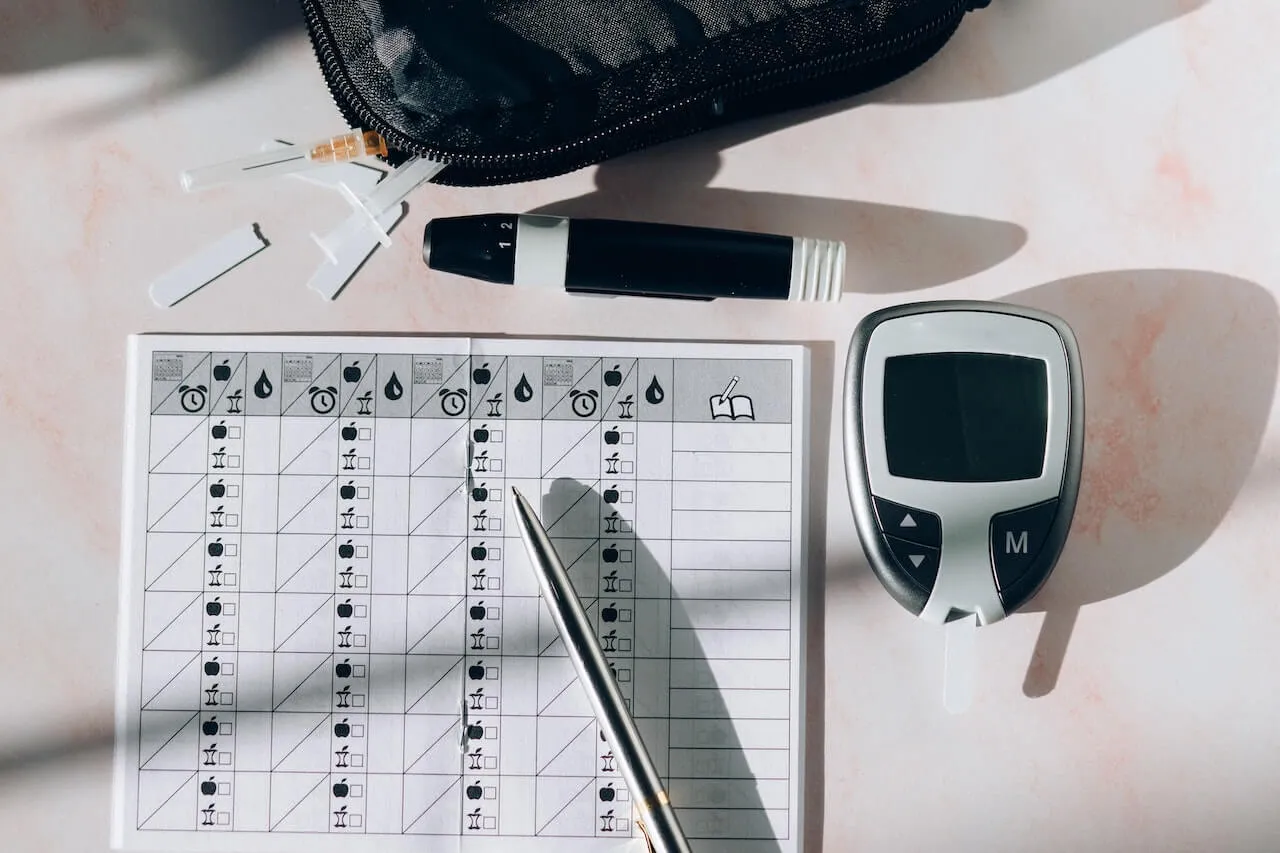A urine glucose test measures whether you have an abnormally high amount of glucose in your urine. This can happen when your blood sugar is too high, glucose is lost in your urine, or your kidneys are not properly reabsorbing glucose.
Glucose is a sugar that is used by your body for energy. Insulin, glucagon, and other hormones regulate its level in the bloodstream. Normally, insulin is secreted by the pancreas into the bloodstream to shuttle glucose into your body cells, where it can be used for energy or stored as fat.
When insulin sensitivity decreases or your pancreas does not produce enough insulin, it can lead to hyperglycemia or high blood sugar. Excess glucose in your bloodstream is then excreted into the urine, causing glycosuria. A urine glucose test can detect glycosuria.
What is a Urine Glucose Test, and What Does It Tell You?
When your blood glucose is too high, tiny kidney filtering units called nephrons cannot reabsorb glucose quickly enough, and some of it is lost in your urine. A urine glucose test measures how much glucose is left in your urine and excreted from your body.
High glucose levels in the urine could indicate a medical problem such as diabetes, a kidney disease, a medication side effect, or pregnancy.
Glucose Urine Test Results
Glucose is not normally found in the urine, so when it is present, it suggests a health problem that needs to be identified and possibly treated.
In healthy individuals, glucosuria can be up to 0.25 mg/mL. More than 0.25 mg/mL is considered abnormal.1,2
Normal values for glucose urine tests are slightly lower:3
- Abnormal range: Glucose levels above 0.8 mmol/L (or 15 mg/dL)
- Normal range: 0 to 0.8 millimoles per liter (mmol/L), equivalent to 0 to 15 milligrams per deciliter (mg/dL).
{{mid-cta}}
Why is It Important?
Diabetes screening is the most common reason for requesting a urine glucose test. Urine glucose tests are quick and painless to check whether your kidneys are reabsorbing all the glucose secreted into your urine. While a urine glucose test is not used alone to diagnose diabetes, it can be an early indicator that requires further investigation.
Risk Factors for Type 2 Diabetes
Risk factors for insulin resistance, prediabetes, and diabetes include:
- Family history of diabetes: If you have parents or siblings with type 2 diabetes, your risk for developing insulin resistance, prediabetes, and type 2 diabetes is also increased.4
- Increased abdominal (belly) fat: An increase in belly fat is associated with high blood pressure and a decrease in insulin sensitivity. Abdominal fat is metabolically active. It secretes inflammatory proteins and hormones that trigger insulin resistance.5
- Sedentary lifestyle: Skeletal muscle can absorb up to 85% of circulating glucose in a healthy person. Muscle mass loss can cause this process to become less efficient.6
- Aging: Getting older is a risk factor for changing blood glucose levels, insulin resistance, and diabetes.6
- Smoking: Chemicals in cigarette smoke increase inflammation and oxidative stress on cells, increasing type 2 diabetes risk by 30% to 40%.7
- Metabolic syndrome: This constellation of symptoms increases your risk for type 2 diabetes. Metabolic syndrome encompasses altered glucose metabolism, increased triglycerides, reduced HDL (good) cholesterol, increased blood pressure, and obesity.
People with these risk factors may have a screening urine glucose test as part of their routine physical exam or if their doctor suspects diabetes or kidney disease.
Early Signs of Type 2 Diabetes
The early signs of type 2 diabetes are nonspecific and overlap with several other conditions. Watch for these symptoms and look for a pattern.
Early signs of type 2 diabetes include the following:
- Polyuria: When excess glucose is excreted in the urine, it pulls water to balance glucose and water. Polyuria is more frequent urination that results from excess glucose in the urine.
- Increased thirst: When you excrete excess glucose and water in the urine, your body becomes dehydrated, and you are thirsty. Increased thirst is to compensate for fluids lost from increased urination.
- Increased hunger: When your body cells cannot get the glucose they need for energy, you get hungry. Unfortunately, lack of food is not the underlying issue, and eating more, especially carbohydrates, can worsen the problem.
- Urinary tract infections: Glucose in the urine and delayed bladder emptying set up a hospitable environment for bacteria to thrive in the urine and cause infections. People with diabetes also have impaired immune function because of poor circulation, making fighting infections more difficult.8
- Blurred vision: High blood sugar levels can cause the eye's lens to swell, making it more difficult to focus an image.
- Fatigue: When body cells do not get enough glucose for energy, it can cause fatigue.
- Unexplained weight loss: Calories are lost when glucose is lost in the urine. High blood sugar also indicates insulin resistance, which means body cells cannot access glucose for energy, so they break down body fat for energy instead.
- Numbness: Over time, high blood sugar can damage small blood vessels that supply nerves and the nerves themselves. Initial symptoms are numbness and tingling that may come and go.

How Does a Urine Glucose Test Work?
A urine glucose test can be done as part of a complete test called a urinalysis, which measures many urine parameters, or as a single urine glucose test. Before doing a urine glucose test, tell your doctor about all your medications and supplements. Some medications, such as antibiotics, corticosteroids, catecholamines, decongestants, and others, can affect your test results.9
To complete the test:
- Use a sterile container to collect the urine sample.
- Wipe and collect a midstream sample, especially if you are doing a full urinalysis.
- Close the urine cup and give it to the healthcare provider or prepare your supplies for your test. Read the instructions on the test kit.
- Open the container of urine test strips. Dip one strip into your urine sample. You may also be asked to hold the strip in your urine stream instead of collecting urine in a cup.
- After waiting for the recommended time, compare your urine strip results to the table on the box. In most tests, the results will indicate a normal result (0 to 0.8 millimoles per liter, equivalent to 0 to 15 milligrams per deciliter) versus an abnormal result (above 0.8 mmol/l or 15 mg/dL) with a color change.
What Does High Glucose in Urine Mean? Six Potential Causes
Normally, there is no glucose present in your urine. A single elevated urine glucose level may have little significance, but it should not be ignored. Talk to your doctor about your test results to see if further testing is necessary to determine whether increased urine glucose suggests diabetes, a kidney problem, or something else.
Diabetes
An abnormally high urine glucose level may result from an abnormally high blood glucose level, indicating type 1, type 2, or gestational diabetes. The kidney has a threshold for how much glucose it can reabsorb. You may exceed this threshold if your blood glucose levels are too high.
Normal blood sugars for people without diabetes are 80–130 mg/dL before eating and less than 180 mg/dL one to two hours after eating. Blood glucose is usually at least 180 mg/dl before it can be detected with a urine glucose test.11
Prediabetes
Increased urine glucose can also occur in prediabetes, a condition in which blood sugars are high but have not met the criteria for diabetes. You can reverse prediabetes, preventing or at least delaying the onset of diabetes.
Gestational Diabetes
Gestational diabetes is a type of diabetes that occurs during pregnancy and generally resolves at delivery. The placenta, an organ that provides the fetus with nutrients, produces hormones that can cause insulin resistance. Genetic predisposition, environmental factors, and medical conditions, such as obesity, can increase the risk of developing gestational diabetes.10
While blood sugar testing is more commonly used to monitor diabetes, urine glucose tests can also be used as a simple way to gauge whether your blood sugar is too high and needs better management.
Renal Glycosuria
In a situation where blood glucose levels are normal, increased glucose in the urine suggests a problem with the kidney and its ability to reabsorb glucose. Renal glycosuria is a much rarer cause of glucose in the urine than diabetes. It can be inherited and cause kidney filtering problems or be part of a genetic condition that affects many body systems.
Diabetic Kidney Disease
Chronically high blood sugar damages blood vessels, including those in the kidneys. When blood vessels are damaged, they affect blood flow into the kidneys. Small blood vessels are part of the kidney filtering units. When blood flow through these vessels decreases, your kidneys cannot filter your blood as well.
Medication Use
Some medications can affect urine glucose test results, including:12
- Corticosteroids
- Birth control pills
- Progesterone
- Thiazide diuretics
- Benzodiazepines
- Catecholamines
- Decongestants
- Niacin
- Some antipsychotic medications
7 Tips to Manage High Glucose Levels in Urine
Glucose in your urine is a sign that your blood glucose is too high or that your kidneys are not filtering your blood as well as they should be. To manage high glucose levels in your urine, check with your doctor to receive a full evaluation and an appropriate diagnosis. If your blood sugar is too high and you can stabilize it, you will reap better health benefits.
High blood glucose is the most likely reason you have high glucose levels in your urine. If you do not have diabetes, high glucose levels may be a warning that your body is developing insulin resistance. Here are some tips to improve your insulin sensitivity and potentially prevent it from progressing to type 2 diabetes.
- Exercise regularly: Exercise at a moderate intensity for at least 150 minutes per week or at a vigorous intensity for 60-75 minutes per week. Add two strength-building sessions per week.
- Improve your sleep: Aim for 7 to 9 hours of high-quality sleep each night.
- Test yourself frequently: Ask your doctor how best to monitor your blood sugar, and whether a CGM or urine glucose test is more appropriate. Urine glucose tests are not sensitive to changes in your body's ability to use glucose well.
- Avoid smoking: Chemicals in cigarette smoke stress your body cells and their capacity to metabolize food optimally. Seek help to quit.
- Consume a healthy diet: Choose carbohydrates with a low glycemic index and a low glycemic load, and fill up on fiber and healthy proteins. Avoid saturated and trans-fats and highly processed foods.
- Avoid excessive alcohol consumption: Alcohol is high in calories which can cause weight gain. Excessive alcohol consumption may also damage liver cells and affect insulin sensitivity.
- Manage your stress: Yoga, practicing mindfulness, breathing exercises, and spending time in nature are all strategies people use to reduce stress and cortisol levels.

Using a CGM with Signos: Real-Time Data, Backed by AI
Signos pairs a real-time glucose biosensor with AI trained on tens of millions of data points to deliver personalized, science-backed guidance for weight management and health. See exactly how your body responds, and take action.
Learn how it works. Ready to get started? Join now.
Topics discussed in this article:
References
- Ferrannini E. Learning from glycosuria. Diabetes. Mar 2011;60(3):695-6. doi:10.2337/db10-1667
- Liman MNP, Jialal I. Physiology, Glycosuria. StatPearls [Internet]. StatPearls 2022.
- McPherson RA, Pincus MR. Henry's Clinical Diagnosis and Management by Laboratory Methods E-Book. Elsevier Health Sciences; 2017.
- Centers for Disease Control and Prevention. (2022, May 25). Family Health History and Diabetes. Accessed March 7, 2023. https://www.cdc.gov/genomics/famhistory/famhist_diabetes.htm
- Lee CC, Glickman SG, Dengel DR, Brown MD, Supiano MA. Abdominal adiposity assessed by dual energy X-ray absorptiometry provides a sex-independent predictor of insulin sensitivity in older adults. J Gerontol A Biol Sci Med Sci. 2005;60(7):872-7. doi:10.1093/gerona/60.7.872
- Chia CW, Egan JM, Ferrucci L. Age-Related Changes in Glucose Metabolism, Hyperglycemia, and Cardiovascular Risk. Circ Res. 2018;123(7):886-904. doi:10.1161/circresaha.118.312806
- Centers for Disease Control and Prevention. (2022, June 20). Smoking and Diabetes. Accessed March 7, 2023. https://www.cdc.gov/diabetes/library/features/smoking-and-diabetes.html
- Nitzan O, Elias M, Chazan B, Saliba W. Urinary tract infections in patients with type 2 diabetes mellitus: review of prevalence, diagnosis, and management. Diabetes Metab Syndr Obes. 2015;8:129-36. doi:10.2147/dmso.S51792
- Walker HK, Hall WD, Hurst JW, eds. Clinical Methods: The History, Physical, and Laboratory Examinations. Butterworths Copyright © 1990, Butterworth Publishers, a division of Reed Publishing.; 1990.
- Garrison A. Screening, diagnosis, and management of gestational diabetes mellitus. Am Fam Physician. 2015;91(7):460-7.
- Roberts JR. Urine Dipstick Testing: Everything You Need to Know. Emergency Medicine News. 2007;29(6). https://alliedhealth.ceconnection.com/files/UrineDipstickTestingEverythingYouNeedtoKnow-1440776910971.pdf
- Smith J. (2017, August 2). Non-Diabetes Drugs and Supplements That Affect Glucose Levels. Accessed March 7, 2023. https://insulinnation.com/treatment/non-diabetes-drugs-and-supplements-that-affect-glucose-levels/




.svg)










.svg)
.svg)
.svg)
.svg)
.svg)
.svg)
.svg)
